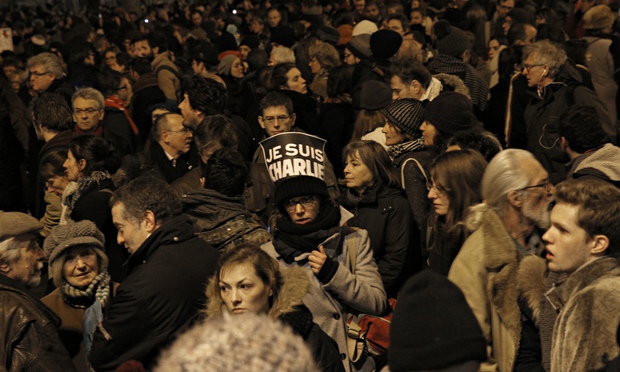
‘Charlie Hebdo’ and the end of the French exception
Today many are asking why Parisians have been attacked in their own city, and by their own people. But for many years the question for those following the issues of foreign policy and religion was why France had suffered so little terrorism in comparison to other European states. After the bombs on the Paris Metro and a TGV line in 1995, there were no significant Islamist attacks until the fire-bombing of the Charlie Hebdo office in November 2011, and the killings of three French soldiers (all of North African origin) and three Jewish children (and one teacher) by Mohamed Merah in Toulouse four months later. These attacks turn out to have been a warning of things to come.
But why was France free of such attacks for over fifteen years, when Madrid and London suffered endless plots and some major atrocities? Given the restrictions placed by successive governments on the foulard (headscarf) and the burka, together with the large French Muslim population (around 10% of the 64 million total), the country would seem to have been fertile ground for fundamentalist anger and terrorist outrages.
One view is that the French authorities were tougher and more effective than, say, the British who allowed Algerian extremists fleeing France after 1995 to find shelter in the Finsbury Park Mosque — to the fury of French officials. Another line is that the French secular model of integration, with no recognition of minorities or enthusiasm for multiculturalism, did actually work. Thus when riots took place in 2005 the alienated youth of the banlieues demanded jobs, fairness, and decent housing — not respect for Islam or Palestinian rights.
A third possible explanation of the long lull before this week’s storm is that French foreign policy had not provoked the kind of anger felt in Spain and Britain by their countries’ roles in the Iraq war, which France, Germany, and some other European states had clearly opposed. Although France had an important role in the allied operations in Afghanistan, its profile was not especially high. Given the slow-changing nature of international reputations the image of France as a friend of Arab states and of the Palestinians endured, while Britain drew hostile attention as the leading ally of the United States in the ‘war against terror’. France, again unlike Britain and the United States, has tended to be pragmatic in negotiations with those who have taken its citizens hostage abroad, facilitating the payment of ransoms and getting them home safely. Its policy was that payments, and the risk of encouraging further captures, were preferable to providing the Islamists with global publicity.
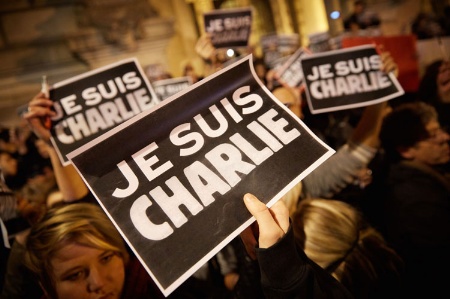
Charlie Hebdo, Mia Khalifa and the sacredness of vulgarity
There are two stories in the media this week that touch on the nature of a free society. The first is headline news in the major newspapers and television networks, while the second is largely relegated to the Buzzfeed-esque websites. I’m referring to the terrorist attack on Charlie Hebdo in Paris, where 12 people were killed by alleged Islamic terrorists, and that Mia Khalifa has become the most popular porn star on the internet’s more saucier websites.
If people make a connection between the two stories it will probably be Islam.
Charlie Hebdo is well known for courting controversy by offending the religious, especially Muslims. The attack is presumably motivated by their publication of cartoons featuring Mohammed and general mockery. Ms Khalifa, as someone who works in pornography, no doubt offends a wide array of people from anti-pornography feminists to the intuitively prudish. However, she has attracted a great deal of abuse online, including death threats, because she is a Lebanese-American and many people in the Levant take exception to her career on religious grounds.
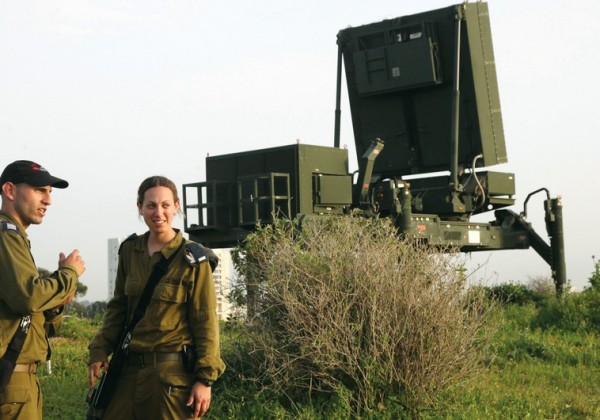
The challenge of Israeli diplomacy
Israeli diplomacy faces a challenge: on the one hand, it has to project an image of Israel as a powerful country; on the other, it has to project an image of Israel as a vulnerable country. Striking the right balance between the two is perhaps the most difficult challenge facing Israeli diplomacy.
Israel has to convey an image of power to deter and an image of vulnerability to convince. Israel is both powerful and vulnerable; conveying such an image to an international audience, often impressed by images devoid of context, is a particularly daunting task.
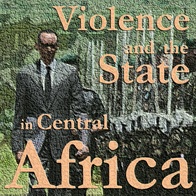
How civil wars end
There is a tendency, even among scholars, to view civil wars as involving two actors—the “government” and “rebels.” This presumption likely arises because historical civil wars that have received the most attention—such as the American and Chinese civil wars—were generally fought between two recognized, organized combatants. Yet, many civil wars (both historical and modern) involve more than two actors.
Take the current civil war in Syria. The Syrian government battles a series of rebel groups that generate a large number of acronyms—ISIS, SLA, SIF, and so on—and that frequently fight amongst themselves. These groups often seek to form coalitions to coordinate their opposition, but the coalitions are unstable and have difficulty controlling their constituent parts. The Syrian conflict also has a large level of external involvement, with the government receiving direct military support from Iran and Hezbollah plus a large number of additional external states and non-state actors seeking to turn the course of the war.
The Syrian opposition’s fragmentation is extreme, but the multiparty nature of the conflict is by no means unique. In fact, many of the wars that have received the most international attention in recent decades—such as in Afghanistan, Columbia, the Democratic Republic of the Congo, Iraq, the Palestinian conflict in Israel, the Darfuri war in Sudan, and Somalia—have involved several rebel groups and significant external involvement.

Are we fighting a just war against the Islamic State?
This question is a little provocative so a clarification is in order. There is a distinction between whether a war is just (jus ad bellum) and whether it is being conducted in a just manner (jus in bello). In the case of IS it is incontrovertible that there is just cause for war. I have argued elsewhere that what is happening in IS occupied territory is attempted genocide. This legitimises military intervention, especially since the Iraqi government has requested help. What I wish to examine here is whether this war is being conducted justly.
Just war theory provides us with several principles that limit what is morally permissible in war. There are two principles that give us cause for concern when assessing the intervention against IS: proportionality and non-combatant immunity. The first of these is the idea that the means of war must be proportional to the ends. Soldiers should aim for victory, but this does not mean that victory can be pursued by any means necessary. There must be, to use Michael Walzer’s term, an ‘economy of force’ (Walzer, Just and Unjust Wars, 129-33). A general should not waste the lives of his soldiers in a bloody offensive when there are more economical means to victory. He should not resort to tactics that will produce longstanding bitterness and prolong the war (such as taking no prisoners).
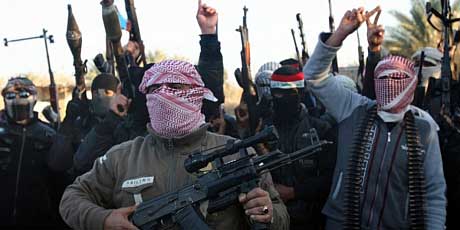
Is bombing ISIS atrocity prevention or a token gesture ?
Last week, the UK government voted, by a huge majority of 481 MPs, to engage in military action in Iraq. Now, once again, we are effectively at war in the Middle East.
For anyone committed to humanitarian inclinations, military force – so easily legitimated through hyperbolic statements of threat, and dramatic images of missiles precisely destroying targets through an aircraft’s gun-sights – should be treated with deep scepticism. Yet the tendency to reflexively reject and virulently condemn military action out of hand is no less lacking in critical reflection than the mindless swallowing of hawkish hyperbole.
The international community has rightly been condemned for standing by and allowing genocide to occur in Rwanda in 1994, and in Darfur in 2003. Is this a similar case? The unfolding and deepening disaster in Iraq seems very much of our own making; so will inaction make us again culpable in unspeakable human suffering? Or is the impulse to fight mere atavistic “war fever”?[1] To answer these questions we need to interrogate two more: first, is the threat of ISIS as great as is claimed? And second, will military action do any good?
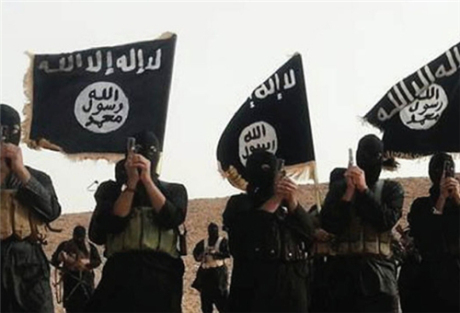
Is the Islamic State committing genocide?
Recently I had a chance to visit the Christian community of Tur Abdin in Eastern Turkey, a long standing community. The monasteries where I stayed dated to the 5th century AD. The people are generous and welcoming, but there is certainly a feeling of isolation and anger in the community as well. You can see Syria stretching out in the distance from the Mor Hananyo Monastery. The people have family and friends in Syria and Iraq. These are the Christians who have been subjected to the brutality of the Islamic State (IS) along with the Yazidi, Shabak and Shia people of the region. Yet, this is nothing new to the people of Tur Abdin.
The monasteries, with their austere beauty and clockwork way of life, give the impression of tranquility. The reality is that this region of the world has been subjected to repeated instances of inter-ethnic and inter-religious conflict. All but one of the people I spoke about the region and its history had lost family in the pogroms of the late 19th century, the terrible bloodletting that accompanied the collapse of the Ottoman Empire, down to the recent conflict between Ankara and the Kurds. Violence is woven into the historical fabric of life in Tur Abdin.
The people are horrified and scared of what is happened a few kilometers from their homes, but they do not expect anyone to help. They’ve seen this before. The international community condemns, prevaricates and retreats. Admittedly, things are starting to happen. Airstrikes against IS have escalated and now include strikes in Syrian territory. Greater assistance is being given to the Kurdish Peshmerga, moderate Syrian forces and the Iraqis. However, this is insufficient. The world needs to decisively intervene in this conflict because the Islamic State is attempting to commit genocide against the minorities in their territory and we all have an obligation to stop them.
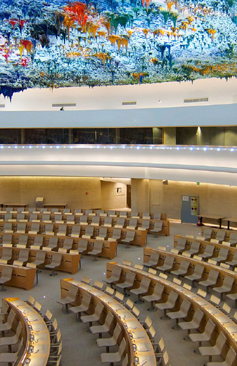
The risk of trivialising international law
The appointment by the United Nations Human Rights Council of a special commission to investigate Israeli actions during the latest war in the Gaza Strip seems to confirm the skepticism with which that organization is held by many people in North America and Europe.
The UN Human Rights Council replaced in 2006 the UN Human Rights Commission. Unfortunately, the change in name was not followed by a change in attitude.
The obsessive concentration on Israel, at the expense of many other countries where human rights are flagrantly violated, is not the exclusive purview of the UN Human Rights Commission, to be sure. The UN in general tends to devote more time to Israel than to any other country; so much so that one wonders if Israel did not exist what would the UN do with so much spare time left.









